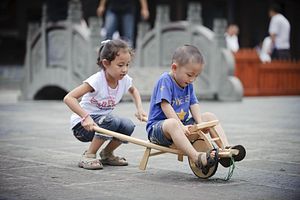When China declared a relaxation of its three-decade-old single child policy in 2013, the National Health and Family Planning Commission predicted that an extra two million babies would be born each year. It warned of consequences such as a shortage of childcare, a lack of spots at schools, and even a prolonged unavailability of jobs in the future. It left out one possible outcome: There would be no baby boom at all.
The 2013 regulation stipulated that if one or both parents is an only child, they would be allowed to have a second offspring. With the fertility rate falling to 1.66, down from 2.87 in 1990, China faces the prospect of aging before it becomes wealthy enough to support a modern social welfare system. In 2014, the new policy was introduced in 29 out of the 31 provinces in China. But by the end of the year, only one million applications had been submitted by parents desiring more children.
In China, opinion is divided over why so few couples have sought to take advantage of the policy. In January, Qun’an Mao, a spokesman for the National Health and Family Planning Commission, told a regular press meeting that the easing of the policy was rolled out gradually throughout the year, so that the result was in fact reasonable. Mao said he expects the number of applications to grow in 2015.
Many media outlets and netizens, however, said that the easing of the one-child policy has not been aggressive enough, and have called for a more radical relaxation. On February 13, an article making this proposal appeared in Economic Information, a publication supervised by Xinhua News Agency, and was widely reblogged. The article reasoned that the country needed to accelerate the adjustment of its reproduction policy because of the rapidly aging population and looming health care issues and labor shortage. It suggested that China further relax the policy within five years to allow all families to have two children.
Meanwhile, public officials in Shanghai and Shanxi Province are reportedly openly urging young parents to have more babies, following the change in national policy.
Few opinions have been proffered to explain Chinese parents’ lukewarm response to the long awaited relaxation of the one-child policy. For many middle-class families, though, money is certainly one issue.
“Housing and education are big chunks of money,” said, Xiao Li, a 32-year-old government officer who lives in Beijing with her husband and six-year-old son. She thinks that the economy has definitely played a part in her family’s decision not to have another baby.
Many young urban professionals like Li also speak of limited energy and spare time for themselves. For Li, this consideration tops the economic factor. “If we have two children, we’ll have significantly less time for ourselves. Both my husband and I like having fun in our own free time.”
Popular opinion in China explains this generation’s emphasis on self-improvement and enjoyment as a product of the one-child policy. This explanation occasionally carries with it implications of selfishness.
“The majority of the people who are eligible to have two children now are born after 1980s. It is important to put into perspective that they are the generation that grew up mostly free from hunger and poverty,” said Feng Wang, a sociology professor specializing in contemporary Chinese society and comparative demographics at the University of California, Irvine. “They have grown up in a very different time from their parents. Having been pampered in small families, they have expectations for their own lives,” he adds, noting that better education and social mobility have postponed their marriage and changed their life perspective.
Boys Over Girls?
In 2014, according to the national census, more than 115 boys were born for every 100 girls. But the tradition preference for boys may not be the same for most urban parents.
“Our boy is very naughty and we need more energy to raise him. It makes me worry that if the next one is another boy, it’d be very tiring,” said Jing Wang, 30, a Guangzhou-based reporter and mother of a 15-month-old boy.
Still, many families are open to the possibility of having a second child. Wang, for one, has conflicted feelings. Her concerns are practical. On the one hand, she fears that another child would add to the burden on the couple, who already have four parents and one child to worry about. “If we have another child, that would make it two of us taking care of six people.” But on the other hand, “I don’t want my child to have the same burden in the future.”
Recognizing that traditional preferences play a less important role in China today, Wang, the sociology professor, expects a change to population policies following a period of debate.
“This is the beginning of a process that will end the one child policy,” he said. “There should be no concern that the policy will be abolished now.”
Ariana Giorgi contributed to the reporting of this article.

































